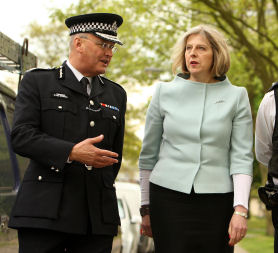New Conservative plan to tackle anti-social behaviour
The Home Secretary Theresa May announces new plans to give communities powers to force police to tackle anti-social behaviour.

Under the new proposals, communities which have suffered from vandalism and intimidation will be given the right to force the authorities to take action.
The Home Secretary told the Conservative Conference in Birmingham that Labour’s anti-social behaviour orders (asbos) will be replaced by measures which would give real redress to victims who have been let down by the system.
“We will give victims and communities the right to force the authorities to take action where they fail to do so.” Home Secretary Theresa May
“Too often we hear stories of victims who are passed from pillar to post, from the police to environmental services to the housing department before being passed back to the police again,” she said.
“We hear about victims who call the police on dozens of occasions but aren’t taken seriously and in many cases are ignored altogether.
“So as part of our reforms to anti-social behaviour powers, we will give victims and communities the right to force the authorities to take action where they fail to do so.”
Mrs May announced that Baroness Helen Newlove, the widow of Garry Newlove – who was killed by a group of teenagers when he tried to stop them vandalising his wife’s car – would become the Government’s “champion for active, safer communities”.
Working alongside Brooke Kinsella – whose 16-year-old brother Ben was stabbed to death two years ago – she would travel the country, visiting communities affected by anti-social behaviour.
The action follows the case of Fiona Pilkington, who killed herself and her severely-disabled daughter Francesca three years ago after suffering continued intimidation from local youths near their home in Leicestershire.
Police reforms
It is part of a plan to make the police more accountable.
Carrying through a commitment made in the Coalition Agreement, she pledged that when Parliament returns the Government would introduce legislation to change the way the police operate:
“No longer accountable to the Home Office, we will make the police accountable to you, the people. From next year, the police will have to publish detailed, street-level crime statistics so you know exactly what is going on where you live.
“Police officers will be required to have regular beat meetings with local residents. And from May 2012, chief constables will answer to police and crime commissioners – directly elected by you, the people, to make sure the police cut crime and keep your community safe.”
Mrs May also announced that the Government would “tear up” Labour’s licensing laws, banning the sale of alcohol at below cost-price and doubling the fine for selling drink to children.
Setting prisoners to work
Earlier, the Justice Secretary Kenneth Clarke had told the conference that prisoners will be expected to work 40-hour weeks to raise money for victims of crime and help cover the cost of keeping them behind bars.
The government wants to relax rules around allowing private firms to employ inmates in 9-to-5 jobs within prisons to end what Mr Clarke believes is a now a life of “enforced, bored idleness where getting out of bed is optional”.
Around a fifth of the money would be earmarked to compensate victims, a plan which was promised in both coalition partners’ general election manifestos.
The plans were greeted with optimism by some victims’ groups. Owen Sharp, acting chief executive of Victim Support, said: “Ken Clarke’s proposals could strengthen the sense of reparation in the justice system with criminals paying something back to victims as well as teaching prisoners new skills and cutting re-offending.
“The funds generated from these plans should be in addition to those that already exist and ensure that victims are at the heart of the criminal justice system.
“We look forward to seeing the detail of how these proposals will work in practice and clarity around how the funds will be allocated.”